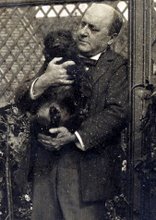Yes, I am at work on a book, as I was when I first made this blog ten years ago. Most of my earlier posts are related in a vague sort of way to two earlier books, my biographies of Oliver Wendell Holmes, an honorable judge, and his dear lifelong friend the novelist Henry James. Photographs of the two men tell the story that I was working on--Wendell Holmes, officer and gentleman, and dear Henry James, well, just look at him holding his dog. They were the Word made Flesh for me, the two sides to our American way of life in the century before the last.
I had wanted to write a play about the Holmes and James families, with a chorus of voices, but there was no reliable account of their different lives at the brief moment in Boston when they were neighbors. Instead, I wrote the first biography of Holmes, which won prizes and was widely reviewed in the U.S. and Europe. I offered a biography of Henry James to Random House, but commercial publishers in the global market, and Amazon's digital marketing, by then had turned books into commodities, fungible objects sold all at the same low price, and it turned out that I badly needed the help I had received at little, Little, Brown & Co.
Sigh, I think it was a good book, but it joined a number of other sorts of books about Henry James and his family, all lumped together, and without the help I had received with Holmes, it did not capture the sensibility of his remarkable family at that brief moment, although once again I told his story from his own perspective, as he narrated it over a lifetime.
Now I am at work again, but very happily engaged with helpful editors and readers, and far from the global market place; we'll see.





